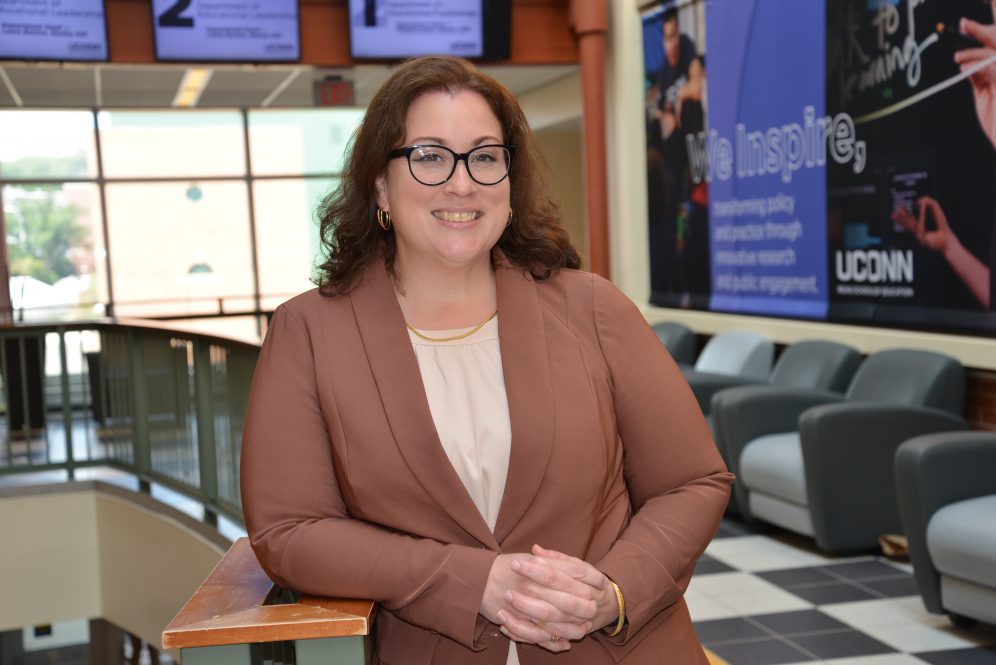In 1997, the book “Talking About Leaving: Why Undergraduates Leave the Sciences” by Elaine Seymour and Nancy Hewitt launched a global conversation in the field of education, exploring the factors that drive college students to leave STEM disciplines. More than 20 years later, new research charting the educational and career trajectories of more than 2,000 students will be published in two new books titled “Talking About Staying,” capping off a study that is “more than a decade in the making.”
“A lot of the research so far has focused on the negative,” says Rebecca Campbell-Montalvo, visiting assistant research professor in the Neag School of Education and the principal investigator of the new study. “And rightly it should – we need to document the things that happen that drive people away. But what are we going to do about it? Using this asset-based approach about what has kept people in instead, I think people are going to find value in that.”
The latest research will follow up on an earlier cohort study launched in 2014 by current UConn Vice Provost for Academic Affairs Gladis Kersaint, then the associate dean of academic affairs and research for the College of Education at the University of South Florida. That first study chronicled the educational journeys of nearly 2,200 engineering undergraduates, oversampling those who were women and/or people of color.
This time around, Campbell-Montalvo is leading a research team that is aiming to follow up with the same individuals who comprised the first cohort, seeing where they landed in the intervening years – whether they went on to pursue graduate education in engineering, entered the professional or academic engineering workforce, or switched disciplines entirely. At its culmination, the study will have collected 12 years of longitudinal data, following students from their last years of high school all the way through graduate education and beyond.
“That’s a huge benefit of our study — because we had started tracking students in their first year of their engineering program, we had asked them to reflect on high school. Now, when we merge the data, we’re going to have this robust mixed data that’s more than a decade long,” Campbell-Montalvo says. “We really got people at the very beginning of their journey, and now, maybe they’ve graduated graduate school, maybe they’re early professors, or they’ve been in the workforce for several years.”
The researchers are interested in not just what percentage of underrepresented students remain in engineering, but also the factors that motivate those who stay in the field, as well as their experiences of feeling supported along the way. Two new surveys and an added round of qualitative interviews with participants will round out the data set. Drawing on theories from anthropology and sociology, the researchers will explore how universities, organizations, and individuals can create a truly welcoming environment for students of marginalized identities in STEM.
“STEM and engineering tend to believe they are meritocratic,” Campbell-Montalvo says. “So if you don’t ‘make it,’ the idea is that you have some sort of personal deficit. But not enough attention is paid to how these spaces are differently welcoming. That’s a novel contribution of this research.”
A key takeaway from the first study, Campbell-Montalvo says, is that the presence of a single supportive mentor with a shared (or similar) identity can make a world of difference.
In addition to serving as role models, these mentors can provide practical wisdom to help students and early-career engineers navigate an environment fraught with bias and discrimination. They can give students concrete career advice, like resume and job interview coaching, while simultaneously offering emotional support and warning students about phenomena like stereotype threat.
“The mentors have said to students, ‘Here’s how people might perceive you because of your identities. But know that that is on them. That’s not on you. You still belong here,’” Campbell-Montalvo says. “And what students in the first study said is by having people warn them, they knew what to expect. So when the stereotyping did happen, that advice really was like an armor — and it helped them stay in their engineering major degree program.”
The new study is also introducing a variable the original research did not account for: LGBTQIA+ identity. By asking retrospective questions, the researchers hope to establish a sense of LGBTQIA+ identity among their original study cohort and understand how individuals’ identities may have shifted over the course of the last decade. This will enter the new research into conversation with queer theory and provide a more robust understanding of how various marginalized identities are treated within engineering.
At the project’s close, the research team hopes to publish several journal articles and two editions of “Talking About Staying” — one focusing on undergraduate education, and the other on industry and academia. The grant funding also includes support for disseminating the project’s findings through workshops and conferences with experts and policymakers.
“I’m really excited that we have this interdisciplinary team, including engineers and scientists as well as anthropologists and sociologists, and we are extending these social theories to things that people sometimes think are not ‘studyable,’” Campbell-Montalvo says. “I think people often see other social problems, like homelessness and things like that, as the ‘topic’ of social science. But this is a great example of how social science can be done to, yes, contribute to theory about these mechanisms through which people [remain in engineering], but also contribute to making society better.”
The project team includes UConn researchers Principal Investigator Dr. Rebecca Campbell-Montalvo, a Visiting Assistant Research Professor in the Department of Curriculum and Instruction in the Neag School of Education; Co-Principal Investigator Dr. Stephany Santos, Executive Director of the Vergnano Institute for Inclusion and Assistant Professor in Residence in Biomedical Engineering; Co-Principal Investigator Dr. Ellen Puccia, University of Connecticut Affiliate and Executive Director of Beta Research Associates, Inc.; and Advisory Board Member Dr. Gladis Kersaint, Vice Provost of Academic Affairs and Dean Emerita and Professor of Mathematics Education in the Neag School of Education, who was the PI on the original grant (NSF Award #1664366). The project also includes Co-Principal Investigators Dr. Candice Idlebird from Claflin University and Dr. Verónica Segarra from Goucher College. The team benefits from the contributions of consultant Dr. John Skvoretz (University of South Florida), and additional Advisory Board Members Dr. Heather Metcalf (Women in Engineering Programs and Advocates Network [WEPAN]), Dr. Andrea Haverkamp (American Federation of Teachers), Dr. Shetay Ashford-Hanserd (Texas State University), and Ms. Danica Chin (Plaskolite).


